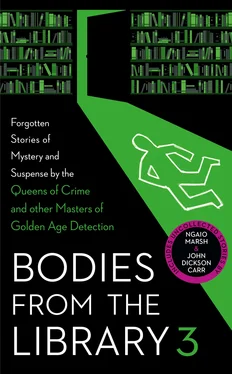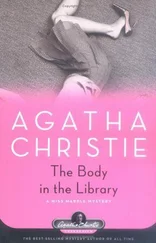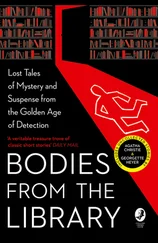‘Listen,’ he said. ‘If your wife were to take a fatal overdose within the next fifty days, would it be worth five hundred pounds to you?’
Extreme clarity of mind came back to Belford in a rush. He spoke precisely, articulating each syllable. It pleased him to feel vowel and consonant marching so orderly from teeth and tongue.
‘It would be exquisitely worth it,’ he said. ‘I stand to receive seventy-five thousand pounds under her will. That would square Ingleborough and put me straight with my debtors. I could easily spare five hundred pounds.’
He made a gesture with his hands. Five hundred pounds in minted gold, running and jingling over the table. Not paper money, but gold. Under his feet he saw deep into the earth, where miners stooped and sweated to drag out the ore for him. Steamers and the noise of the dockyards—leagues of ocean—the work of the world bringing the wealth of the world to his feet. He saw the pictures best without ever losing sight of the quiet room and the four faces clustered beneath that lamplight. Only, on the screen of his imagination, the moving map of the something was mightily unrolled.
‘Very good,’ said Mr Smith. ‘You have your cheque book with you? You will write us a cheque for £500, payable—we will allow a margin—fifty-six days from now. That will bring us to the 17th of December—eight weeks precisely. The removal, you understand, may take place earlier, but in no case later than fifty-six days hence, when the cheque will be presented. That is fair, I think. If, between now and the day of the removal you should change your mind, you have only to leave word for me at Rapallo’s; but when once the removal has occurred it would be unwise to endeavour to stop the cheque. We take our precautions, of course. Have you been abroad lately, by the way?’
‘I was in Germany last May.’
Dr Schmidt sniggered and rose from the table.
‘You need not hesitate to sign,’ went on Mr Smith. ‘It is our pleasure as well as our business to provide these easy little accommodations for our clients. Make it out, please, to Smith & Smith. Thank you—that is admissible. It is remarkable how readily these trifling difficulties can be removed with a stroke of the pen.’
Belford contemplated his signature. The bold outline of the B pleased him, the swaggering lift and drop of the l and f , and the flourish of the final d . Ludicrous, that he should have suffered so long and so acutely, when that powerful pen-shape on a slip of pink paper could set him free.
‘Anything more?’ he asked.
‘Only your name to the Removal Order,’ said Mr Smith.
He sighed again, happily. The paper began ‘Order to Remove’—then came a blank space, with a dotted line at the bottom on which his freshly written name stood out blackly. Mr Smith took the paper from him and filled in at his dictation his wife’s name and address and a date—‘on or before the 17th of December’. The laughter that had seized on him before had him in its grip again. He bellowed, clinging to the table for support.
‘Do you know what time you came home last night, Adrian?’ demanded Mrs Belford, peevishly. Without waiting for a reply she went on, ‘It was a quarter past three in the morning. I will not have these hours kept in my house. There is no godly or respectable occupation that could detain you so long. What can the servants think of you?’
Belford smiled. He knew that it had been past three o’clock when he returned. The white face of the clock on the landing had struck him as exceptionally ludicrous with its hands all askew and its two round winder-holes goggling at him like reproving eyes. Time had stood still for him during the centuries which it had taken him to climb the interminable staircase. He had slept in the House of the Poplars, and dreamed—what dreams! Even now he chuckled over these fantastic dreams.
‘It’s nothing to laugh at,’ said Mrs Belford. ‘I can only imagine that you were—intoxicated. It is most disgusting. Did you even remember to bring home my tablets?’
This staggered Belford. Had he done so? Or had he left them in the hands of the sniggering German doctor? He put his hand to his coat pocket, drew out a small package, wrapped in white paper and sealed at both ends with sealing wax. He stared at it. He so distinctly remembered having unwrapped it in the restaurant.
Mrs Belford twitched it from him.
‘At any rate, I am glad you were not so lost to decency as to leave that behind.’ She broke the seals and extracted the bottle, setting it upright on the bedside table. ‘Fortunately, I still had two or three tablets in the old bottle. Otherwise, I suppose, I might have lain awake in agony all night as far as you were concerned.’
‘Why don’t you get the stuff from Mullings, instead of depending on me?’ enquired Belford, impatiently.
‘I have told you before, I do not care to have my affairs known to the local chemist. Mullings is a perfect centre of gossip. And that is not the point. Is there any reason why you should object to performing a trifling service for your own wife?’
‘None whatever,’ said Belford, cheerfully. He felt curiously well and happy that morning. Whatever it was that he had drunk at Rapallo’s, it certainly left no hangover. The only reminder of his curious mental condition the night before was a tendency to see the funny side of everything. It was with difficulty that he checked a guffaw.
‘I suppose it is useless to ask you where you were or what you were doing?’ pursued Mrs Belford.
‘I met a man and dined with him. We talked business.’ Belford was amused. He looked down at his wife and, with a recurrence of that extraordinary clarity of vision, his eyes seemed to pierce her sallow skin and watch the sluggish and diseased blood as it pumped along the arteries, gathering up God-knew-what poisons by the way.
‘See that it doesn’t occur again,’ said Mrs Belford. ‘If this kind of thing is going to become habitual, I shall be forced to take steps. My dear father, who amassed his little fortune by hard work and sober living, would turn in his grave to think of its passing into the hands of a drunkard and debauchee.’
Belford again controlled his twitching laughter-muscles, and apologised. ‘The happy hypocrite.’ What a good phrase that was, and how well it expressed him. He ran down the stairs on escaping from the sick-room. Indeed, he seemed to float. His feet scarcely touched the treads. He was so buoyant that he could have skimmed right out of the front door on the wings.
His delicious hilarity lasted all day. He astonished his typists and clerks by his pleasant humour. He had only one disagreeable moment, when he took out his private cheque-book to pay a small personal bill. There was a blank counterfoil. He stared at it. Had he really given that cheque for £500 to Smith & Smith? His memory was not at fault; he remembered clearly everything that had happened, up to his falling asleep in the House of the Poplars. He remembered it—but he had not really believed in it. But the cheque was gone. ‘Order to Remove’—‘on or before 17th December’—‘If you should change your mind, leave a message at Rapallo’s’—‘It would be unwise to change your mind after the Removal has occurred.’ A nauseating feeling of horror rose up from some black deep of his subconsciousness. But it passed, and left him laughing at himself.
Three or four times during the next six weeks he returned to Conduit Street and walked past Rapallo’s. Once he went in and ordered a sandwich and a glass of beer. A different pair of barmen were on duty, and he saw nothing of any Mr Smith. He came out without leaving any message. If he had had any fixed intention of doing so, the ominous sign of ‘Golding & Moss, Financiers’, just visible over the lace curtain, would have deterred him. In any case, it was absurd to suppose that Smith & Smith, or Brown, Jones & Robinson, could possibly influence his wife to take an overdose of medicine. As for the cheque, if he had really drawn it, it could make no difference. Bankruptcy and disgrace are bankruptcy and disgrace; and £500 one way or another was a drop in the bucket.
Читать дальше











